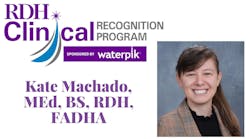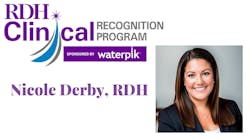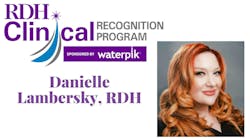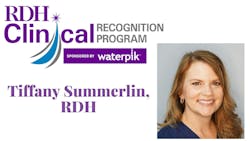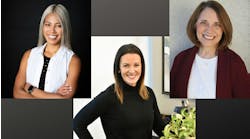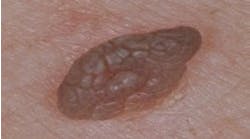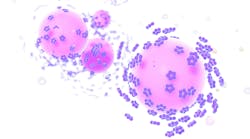Kate Machado, MEd, BS, RDH, FADHA: Educator and lifelong learner
When asked what she enjoys about clinical hygiene, Kate Machado goes right to the basics: “I love using my favorite instruments and getting that black subgingival calculus removed in a difficult area.” She also enjoys patient education and product recommendations. “When a patient finally gets that ‘light-bulb’ moment and praises my hard work, it truly makes me feel good, especially on a hard day.”
Kate is also an educator. While clinical hygiene is “the backbone of our profession,” where many hygienists choose to remain for their entire careers, Kate appreciates the versatility that a dental hygiene degree offers. She says, “Our profession is absolutely amazing! It offers us many different opportunities, which are sometimes unexpected.”
Getting involved from the start
In her seven years of practice, Kate has been very involved in the profession. Along with clinical hygiene, she has been a clinical educator since 2019. She is a member of Colgate’s Oral Health Advisory Board (2023-2024) and the inaugural class of ADHA Fellows. In addition, Kate is an inaugural writer for Today’s RDH, attends national conferences, and helps out at a local nonprofit.
Kate takes pride in being a lifelong learner. She says, “I am constantly taking CE courses and webinars and attending conferences, which I thoroughly enjoy. Being so involved since the very beginning of my career has allowed me to be well networked in the profession. This has also helped me bring new knowledge, research, methodology, and products to not only the clinical setting with my patients, but also to my students.”
Patient education
“Sometimes patients are hesitant if you aren’t their usual hygienist, or they have dental anxiety or have had a bad experience in the past. They appreciate what I have done for them, giving them personalized recommendations and involving them in their own care. I always involve patient education in my appointments, even when patients are dismissive at first.
"For example, if a patient who has diabetes does not monitor their blood sugar or does not know their A1C, I speak on the importance of knowing that information. Another aspect of my clinical philosophy is that if your mouth is not healthy, neither is your body, and vice versa. I am also very passionate about updating our verbiage around what we do as dental professionals, such as never using the word ‘cleaning,’ as I believe that minimizes what we do.”
Advice for new dental hygiene grads
As an educator, Kate understands what new grads go through. She says, “First, I want them to know their worth as a dental hygienist and a health-care provider. They are not tooth cleaners; they have worked too hard to be categorized as just that. Second, continue to learn, as there is always something new. That’s how we grow. Without continuous learning, how can you help your patients and yourself? Dentistry constantly evolves, so we must too.”
Kate helps new grads think of themselves positively when interviewing. Being newly graduated is not a weakness or disadvantage. “Show the employer that although you are a new grad, you do have clinical experience and have not created bad habits yet.” She also recommends asking questions during the interview, including the amount of time given for different appointment types, radiograph frequency, office policies, benefits, care philosophies, etc. Shadowing in the office prior to accepting a position helps new grads see firsthand how the office runs and what a possible day in the practice might look like.
Kate’s clinical tips
Kate credits taking CE courses and being as involved as possible in our field for making her a better clinician. “There are so many opportunities to receive CE nowadays, especially online. There’s always a free webinar being offered. With continued learning, we can implement new therapies to our patients and provide updated recommendations that are backed by evidence-based research.”
Finally, Kate recommends advocating for yourself. She says, “Find a mentor and don’t be afraid to ask questions.”
Outside the dental world, Kate says she is a movie buff and dessert lover who loves traveling, being creative, and spending time with friends and family. “I wouldn’t be anywhere without my family, especially my parents!”
Connect with Kate on:
Instagram: @rdhkate2_
LinkedIn: Kate Machado, RDH, BS, MEd, FADHA
Tiffany Summerlin, RDH: Taking oral care on the road
Tiffany Summerlin, BSDH, RDH, is a US Marine Corps veteran, having given five years of active duty in service to our country. She states that her military service has provided her with tenacity and out-of-the-box thinking. It also has shown her that there is always a way to make a passion become a reality.
Finding her path
As a nontraditional student in the dental hygiene program at West Virginia University, Tiffany began her freshman year as a 29-year-old wife and mother of two young children. It was there she was drawn to the career paths of hygienists who were meeting the needs of individuals in unique and different ways. After three years in traditional private practice, she realized that it wasn’t the right path for her.
After she got a taste of public health dental hygiene and research, she knew the path she wanted to take, and she set about making her passion a reality. With the support of the Monongalia County Health Department as her employer, Tiffany created and coordinates a mobile dental program, Smile Express, which serves school-aged children, adults in nursing homes, and individuals in substance use recovery centers. She happily reports that she has no plans to ever leave this position.
Tiffany the only public health dental hygienist in West Virginia who coordinates a dental program, provides all preventive patient care, and also serves as driver of the 38-foot mobile clinic. She says, “The hats I wear are many, with some more comfortable than others. I have written grants and been awarded more than $1 million in funding for the mobile program as well as support for our brick and mortar office.”
When asked what she particularly enjoys about clinical hygiene, Tiffany says, “Clinical dental hygiene is much more than what my hands perform inside of a patient’s mouth. I pride myself in providing excellent dental care, but I am much more grateful for providing a safe place for a patient to be vulnerable. Many of the patients I see have avoided or have not been provided access to dental care; thus, they present with both physical and emotional pain. The psychological barriers that I jump over with my patients provide me with a lot of satisfaction. Knowing that my small interaction with them has the potential to change the trajectory of their life is something that fuels me on those hard days. And there are many of those!”
Advice for new dental hygiene grads
It took some time for Tiffany to find her comfort zone that allowed her to grow into the person and clinician she is today. To any new hygiene grad, she gives the following advice: “Look for the place you belong. What works for your classmates isn’t necessarily going to work for you. If you don’t feel happy pulling into your parking spot in the morning and you don’t feel like a valued part of the team, don’t hesitate to start looking for something else. Always give your best, but never tolerate disrespect. You spend too much time at work to not feel good about yourself for being there.”
Tiffany’s clinical tips
“Take care of your body. Exercise and hydrate. Invest in ergonomic angle loupes and a headlight. Get fitted for the right saddle chair. Don’t feel bad asking your patient to move during their short time with you—you have to do this all day long!
“Focus on the things you do the most, and simplify. When I am providing school-based services, placing 100 sealants and a lot of SDF in a day is pretty common. I take the time to prepare the patient and make them feel like they’re in the driver’s seat, and I have all my supplies in order, so it’s a breeze. If you place sealants or SDF regularly, I highly recommend using an OptraGate. It is a game changer for patient compliance and the ability to keep the teeth dry. I would hate to practice without this product!”
Connect with Tiffany on:
facebook.com/tiffany.smithsummerlin/
linkedin.com/in/tiffany-summerlin-rdh-73177019/
facebook.com/mchdsmileexpress
Editor's note: This article appeared in the April/May 2024 print edition of RDH magazine. Dental hygienists in North America are eligible for a complimentary print subscription. Sign up here.
Kirsten Brancheau, BA, RDH, has been practicing clinical dental hygiene since 1978. She earned an associate’s degree in applied science in dental hygiene from Union County College in 1977 and a bachelor of arts degree in English literature from Montclair State University in 1988. She is a member of the American Dental Hygienists’ Association. Brancheau is also a freelance proofreader, editor, and writer. She can be reached at [email protected].
